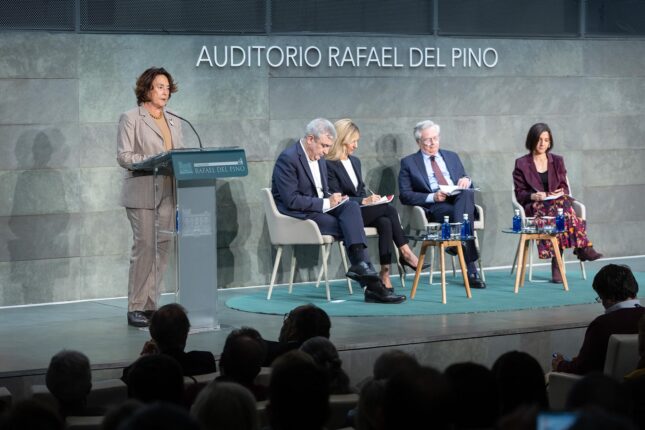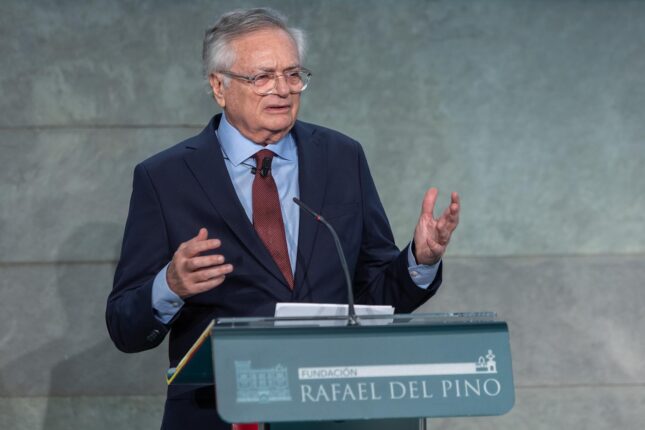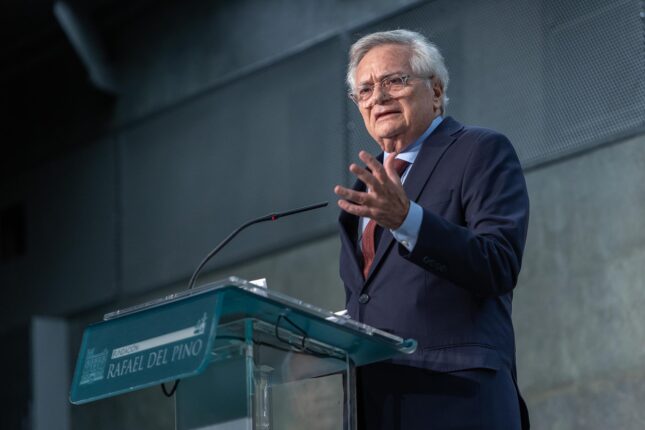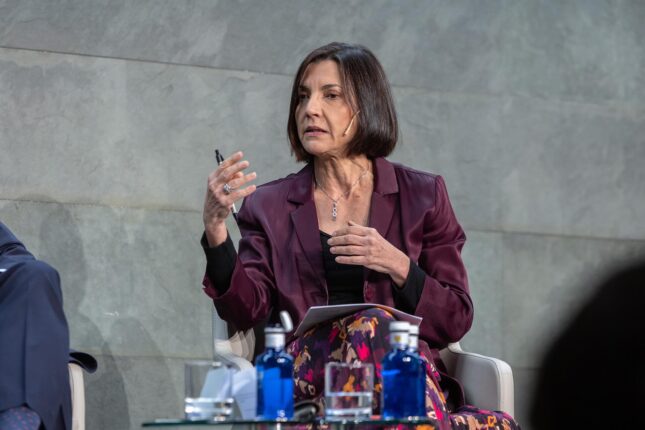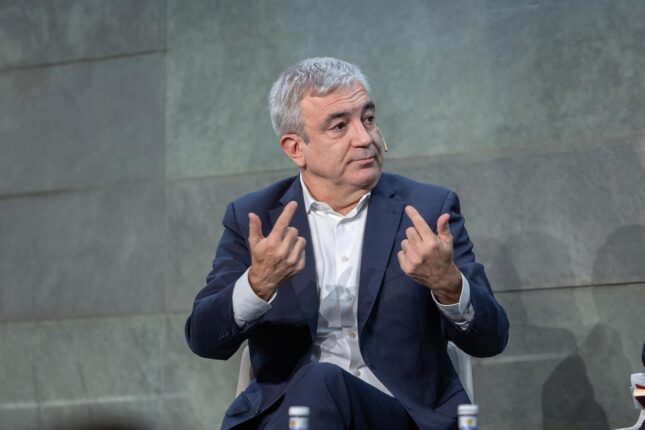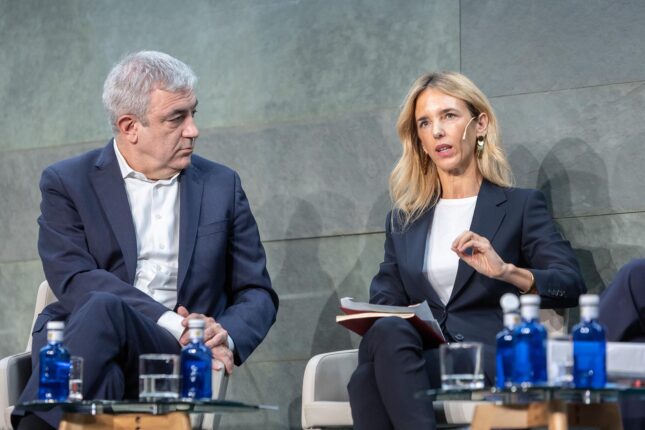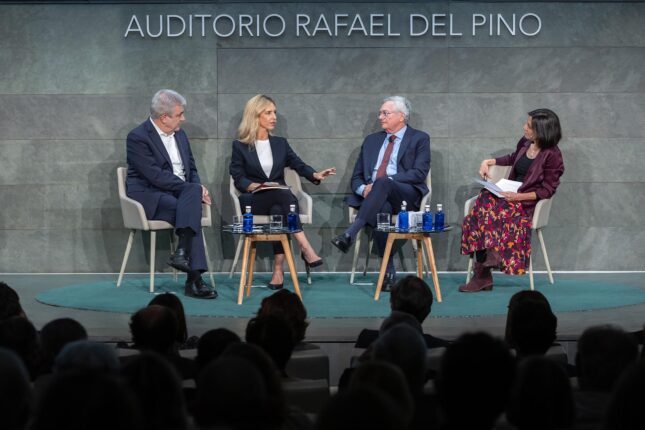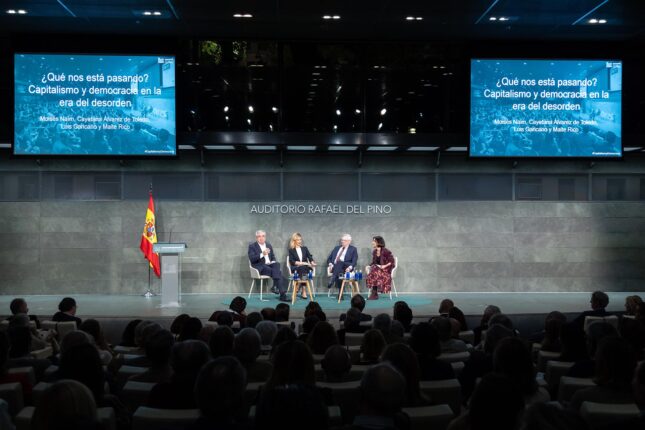On 30 October 2024, the Rafael del Pino Foundation organised the Dialogue "What is happening to us? Capitalism and democracy in the age of disorder" with the participation of Moisés Naím, Cayetana Álvarez de Toledo, Luis Garicano and Maite Rico on the occasion of the presentation of the latest book by Moisés Naím "What is happening to us: 121 ideas to scrutinise the 21st century" published by Debate.
Moisés Naím is a Venezuelan writer and columnist who edited between 1996 and 2010 the magazine Foreign Policy and since 2011 presents Naím effecta weekly television programme on international affairs that is broadcast in dozens of countries on the Colombian television network NTN24. He also collaborates with the most prestigious international media such as The Atlantic (USA), El País (Spain), Reform (Mexico) or La Repubblica (Italy). In recognition of this work, in 2011 he received the Ortega y Gasset Prize, the highest award in Spanish journalism. Moisés Naím is a Distinguished Fellow at the Carnegie Endowment for International Peace, and is a former Venezuelan Minister of Development, former Director of the Central Bank of Venezuela and former Executive Director of the World Bank. His books Unlawful (Debate, 2007) and The end of power (Debate, 2013) were both international successes. The British magazine Prospect in 2013, and the Gottlieb Duttweiler Institut in Switzerland selected him as one of the 100 global thought leaders in 2014 and again in 2015.
Cayetana Álvarez de Toledo holds a PhD in History from Oxford University. She is a member of the Partido Popular for Barcelona in the Congress of Deputies of the Kingdom of Spain and has been director of the International Area of the FAES Foundation. In 1996 she obtained her BA in Modern History from Oxford University with honours and was made an honorary senior scholar at New College. In the same year she began her doctoral studies at Oxford University under the direction of the Hispanist and Prince of Asturias Award winner, Sir John Elliott. In 2000 he obtained his doctorate with a thesis on politics and reformism in the Spanish Monarchy in the 17th century. It was published by Oxford University Press in 2004 (Politics and reform in Spain and Viceregal Mexico. The life and thought of Juan de Palafox, 1600-1659) and translated into Spanish in 2011 (Juan de Palafox, Obispo y Virrey; Ed. Marcial Pons). After obtaining her PhD, Cayetana joined the newspaper El Mundo as editor of the Opinion section. She was an editorialist, columnist and Head of Section. During those years she also worked as a political analyst on the radio. In September 2006, she made the leap to politics, joining the Partido Popular as Director of the Cabinet of the Secretary General. In 2008, Cayetana was elected as a Popular Party Member of Parliament for Madrid. During the 9th legislature, she held the position of Deputy Spokesperson of the Popular Parliamentary Group, with responsibility for the Legal-Institutional area. In the general elections of November 2011, Cayetana once again won a seat in the Congress of Deputies for Madrid, where she has been Vice-President of the Joint Committee for the European Union and member of the Constitutional and Justice Committees. She also served as head of analysis for the Partido Popular in Madrid. In early 2012, Cayetana joined FAES Foundation as Director of the International Area, a position she held until January 2016.
Luis Garicano is Professor of the School of Public Policy at the London School of Economics. He began his academic career at the Booth School of Business at the University of Chicago, where he achieved the rank of Senior Lecturer in Economics and Strategy after 10 years on the faculty, and subsequently at the London School of Economics, where he has been a Senior Lecturer in Economics and Strategy in the school's Economics and Management departments and head of the Managerial Economics and Strategy Group; he has also been a visiting professor at other institutions, including MIT, Columbia Business School and the London Business School. He has been an economist at the European Commission and McKinsey & Company, where he also held an endowed chair with the FEDEA foundation. His research has appeared in leading international academic journals in economics, such as The Quarterly Journal of Economics, The Journal of Political Economy, The American Economic Review y The Review of Economic Studies. For a few years, Garicano stepped away from academia and became a Member of the European Parliament (MEP) from 2019 until August 2022. During his time in the EP he was Vice-President of the Renew Europe Group in the Parliament, in charge of economic affairs, and Vice-President of the European political party Alliance of Liberals and Democrats for Europe (ALDE Party). He was one of the drafters of the legislation for the European Recovery and Reconstruction Fund, of the initial legislation on the Carbon Adjustment Mechanism, and led the efforts of the centrist group in the European Parliament (RenewEurope) on Russian sanctions and aid to Ukraine - he travelled for this purpose to Lviv and Kyiv twice in the first 2 months of the war. He has recently co-written (with Beatrice Weder di Mauro and Dominc Rohner) a CEPR book on the "Economic consequences of the war in Ukraine". Luis Garicano holds a BA in Economics and Law from the University of Valladolid, an MA in European Economic Studies from the College of Europe in Bruges and an MA and PhD in Economics from the University of Chicago. He has contributed opinion articles to international media (e.g., Financial Times, Le Monde, Wall Street Journal or The Economist) and Spanish (e.g, El País, El Mundo, ABC y El Confidencial).
Maite RicoColumnist for EL MUNDO, she has been deputy editor and founder of LA LECTURA, the newspaper's cultural magazine. She is also an analyst at Onda Cero and EsRadio. Until 2018 she was at EL PAÍS, where she was deputy editor after developing her career in the International and Opinion sections. She was a war reporter in Bosnia, Somalia and Libya, Latin America correspondent and editorialist. He then directed El País Weekly and launched the supplement Ideas. She is co-author, with Bertrand de la Grange, of the books Marcos, the brilliant imposture (Aguilar, Mexico and Madrid, 1998; and Plon, Paris, 1998), on the Zapatista uprising in the Mexican state of Chiapas, and Who killed the bishop? Autopsy of a political crime (Planeta, Mexico, 2003, and Martínez Roca, Madrid, 2005), on the assassination of the Guatemalan bishop Juan Gerardi.
